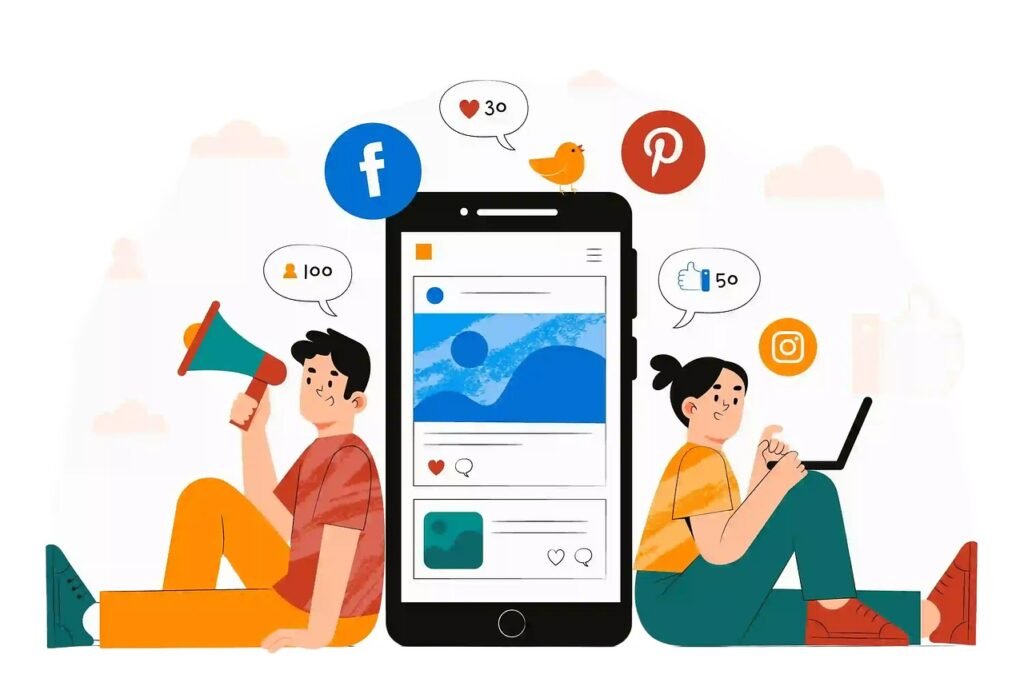- 1. How Widely Used is Facebook in 2024?
- 2. What Makes YouTube the Most Widely Used Online Platform?
- 3. How Significant is Facebook's Daily User Engagement?
- 4. How Much Time Do Users Spend on Facebook?
- 5. What is Instagram's Reach and Growth?
- 6. How Popular is TikTok Among U.S. Adults?
- 7. What is the Projected Global Social Media Ad Spend?
- 8. How Effective are Facebook's Advertising Features?
- 9. How Can Businesses Benefit from Facebook Shops?
- 10. What Role Does Live Chat Play in Conversions?
- 11. How Pervasive is Facebook Usage Among Internet Users?
- 12. How Effective is Facebook Video Content?
- 13. What is the Impact of Facebook Stories?
- 14. How Prevalent is Instagram Stories Usage?
- 15. How Does LinkedIn Serve B2B Marketers?
- 16. How Effective is LinkedIn for Content Distribution?
- 17. How Active is Twitter's User Base?
- 18. What is the Average Daily Time Spent on Social Media?
- 19. What is the Global Social Media Penetration Rate?
- 20. Which Region Has the Highest Social Media Penetration?
- 21. Which Country Has the Highest Social Media Penetration?
- 22. How is Social Media Usage Distributed by Gender?
- 23. What is the Engagement Rate for Facebook Page Posts?
- 24. How Do Social Media Ads Influence Consumer Behavior?
- 25. What Are the Most Popular Social Media Platforms in the U.S.?
- 26. How Do Demographics Influence Social Media Use?
- 27. How Does Social Media Use Vary by Education Level?
- 28. What Are the Trends in Social Media Video Content?
- 29. How Does Social Media Support E-Commerce?
- 30. How Do Social Media Platforms Differ in User Interaction?
- Conclusion
- We got all the latest Marketing Stats here:
Social media has become an integral part of our daily lives, reshaping how we communicate, consume information, and make purchasing decisions. For businesses, social media offers unprecedented opportunities to engage with customers, build brand loyalty, and drive growth. This article delves into the benefits of social media by exploring key statistics for 2024, providing insights and actionable advice for leveraging these platforms effectively.
In today’s digital age, social media is not just a platform for socializing; it’s a powerful tool for businesses to connect with their audience, promote their products, and analyze consumer behavior. With billions of users worldwide, social media platforms offer a vast audience for marketers to tap into. This article will highlight key statistics that demonstrate the immense benefits of social media for businesses in 2024, offering a detailed understanding of its impact and future trends.
1. How Widely Used is Facebook in 2024?

Facebook’s User Base
Facebook remains the most used social media platform with 3.06 billion monthly active users as of April 2024, marking a growth of 3.44% year-over-year (YoY)【77†source】. This massive user base makes Facebook an essential platform for businesses looking to reach a broad audience.
Strategic Insights
For marketers, Facebook’s vast user base means unparalleled access to potential customers. By leveraging Facebook’s advertising tools, businesses can target specific demographics, interests, and behaviors, ensuring their ads reach the most relevant audience.
Additionally, Facebook’s analytics tools provide valuable insights into user engagement and ad performance, allowing for continuous optimization of marketing strategies.
2. What Makes YouTube the Most Widely Used Online Platform?
YouTube’s Popularity
YouTube is used by 83% of U.S. adults, making it the most widely used online platform in the country【78†source】. The platform’s extensive reach and diverse content make it a vital tool for marketers.
Engagement Opportunities
YouTube offers unique opportunities for businesses to engage with their audience through video content. Videos can demonstrate products, share customer testimonials, and provide educational content.
With YouTube’s advanced targeting options, businesses can ensure their videos reach the right audience, maximizing engagement and conversion rates.
3. How Significant is Facebook’s Daily User Engagement?
Daily Active Users
As of Q4 2023, Facebook had 2.11 billion daily active users, an increase of 5.5% YoY【77†source】. This high level of daily engagement highlights Facebook’s importance in users’ lives and its potential for businesses.
Maximizing Engagement
To capitalize on Facebook’s daily user engagement, businesses should regularly post engaging content, interact with their audience through comments and messages, and utilize Facebook Live for real-time interaction.
Running targeted ad campaigns and using Facebook’s retargeting options can further enhance user engagement and drive conversions.
4. How Much Time Do Users Spend on Facebook?
User Activity
The average US adult spends 33 minutes a day on Facebook【77†source】. This consistent daily usage provides ample opportunity for businesses to capture users’ attention.
Content Strategy
To make the most of the time users spend on Facebook, businesses should create a mix of content that includes informative posts, entertaining videos, and interactive polls or quizzes.
Posting at times when users are most active can increase visibility and engagement. Monitoring performance and adjusting content strategies based on analytics can help maintain user interest and engagement.
5. What is Instagram’s Reach and Growth?
Instagram’s User Base
Instagram has over 2 billion monthly active users, with 47% of U.S. adults using the platform【77†source】【78†source】. This substantial user base makes Instagram a critical platform for visual marketing.
Leveraging Instagram
For businesses, Instagram offers numerous features to enhance brand visibility and engagement, such as Stories, Reels, and IGTV. By creating visually appealing content and utilizing Instagram’s shopping features, businesses can attract and convert followers into customers.
Engaging with users through comments and direct messages can also foster a loyal community around the brand.
6. How Popular is TikTok Among U.S. Adults?
TikTok’s Growth
33% of U.S. adults use TikTok, up 12 percentage points from 2021【78†source】. TikTok’s rapid growth and high engagement levels make it a powerful platform for reaching younger audiences.
Effective TikTok Strategies
Businesses can leverage TikTok’s popularity by creating short, engaging videos that align with current trends. Collaborating with influencers and utilizing TikTok’s advertising options can further expand reach and drive engagement.
Consistently posting creative content that resonates with TikTok’s user base can help businesses build a strong presence on the platform.
7. What is the Projected Global Social Media Ad Spend?
Ad Spend Growth
The global social media ad spend is expected to surpass $300 billion by 2024, with a projected growth rate of 6.1%【76†source】【77†source】. This significant investment underscores the effectiveness of social media advertising in reaching and engaging consumers.
Optimizing Ad Spend
To maximize the return on social media ad spend, businesses should carefully target their ads using platform-specific tools, such as Facebook’s Audience Insights and Instagram’s demographic filters.
Regularly monitoring ad performance and adjusting campaigns based on analytics can help ensure that ad budgets are used efficiently and effectively.
8. How Effective are Facebook’s Advertising Features?
Facebook Ad Metrics
Facebook generates 4 million likes every minute, and posts native videos that increase interaction by 600%【77†source】. This high level of engagement demonstrates the effectiveness of Facebook’s advertising features.
Utilizing Facebook Ads
Businesses can leverage Facebook’s advertising features by creating visually appealing ads that encourage interaction. Using Facebook’s advanced targeting options, such as Custom Audiences and Lookalike Audiences, can help reach the most relevant users. Incorporating video content in ads can significantly boost engagement and conversions.
9. How Can Businesses Benefit from Facebook Shops?
Facebook Shops Usage
Facebook Shops have more than 1 billion monthly active users【77†source】. This feature allows businesses to set up an online store within Facebook, providing a seamless shopping experience for users.
Enhancing E-Commerce
By setting up a Facebook Shop, businesses can reach a large audience and make it easy for users to browse and purchase products without leaving the platform. Integrating product catalogs, offering exclusive deals, and using Facebook’s advertising tools to promote the shop can drive traffic and sales.
10. What Role Does Live Chat Play in Conversions?

Impact of Live Chat
Customers who engage in Facebook live chat are 53% more likely to make a purchase from a business【77†source】. This statistic highlights the importance of real-time interaction in driving sales.
Implementing Live Chat
Businesses should implement live chat on their Facebook pages to provide instant customer support and answer queries. Training staff to handle live chat efficiently and ensuring prompt responses can enhance the customer experience and increase the likelihood of conversions.
11. How Pervasive is Facebook Usage Among Internet Users?
Facebook Usage Rates
72.13% of internet users in the United States use Facebook regularly【77†source】. This high usage rate underscores Facebook’s dominance as a social media platform and its importance in digital marketing strategies.
Reaching a Broad Audience
For businesses, the extensive reach of Facebook means that a significant portion of their target audience is likely active on the platform. Utilizing Facebook’s extensive suite of marketing tools, including targeted ads, engagement metrics, and content scheduling, can help businesses effectively reach and engage with their audience.
12. How Effective is Facebook Video Content?
Video Interaction
90% of Facebook users post native videos, and video posts increase interaction by 600%【77†source】. Videos are highly engaging and can capture the attention of users more effectively than static images or text posts.
Creating Engaging Video Content
To capitalize on the high engagement rates of video content, businesses should create high-quality, engaging videos that tell a story, showcase products, or provide valuable information. Utilizing Facebook’s video tools, such as live streaming and Stories, can also enhance visibility and interaction.
13. What is the Impact of Facebook Stories?
Stories Usage
Over 1 billion Stories are posted every day across Facebook apps【77†source】. Stories are a popular feature that allows users and businesses to share content that is available for a limited time, creating a sense of urgency and immediacy.
Leveraging Stories for Marketing
Businesses can use Facebook Stories to share behind-the-scenes content, promote limited-time offers, and engage with their audience in a more personal and informal way. The ephemeral nature of Stories encourages frequent posting and can help maintain ongoing engagement with followers.
14. How Prevalent is Instagram Stories Usage?
Instagram Stories
Instagram Stories are used by 500 million users daily【76†source】. This feature has become a key part of Instagram’s user experience, offering businesses a dynamic way to connect with their audience.
Effective Use of Stories
To make the most of Instagram Stories, businesses should post regularly, use interactive features like polls and questions, and incorporate user-generated content. Highlighting Stories on the profile can also ensure that valuable content remains accessible beyond the 24-hour limit.
15. How Does LinkedIn Serve B2B Marketers?
LinkedIn’s User Base
LinkedIn has 875 million members worldwide【76†source】. It is a critical platform for B2B marketers, providing a professional network where businesses can connect, share content, and generate leads.
Maximizing LinkedIn for B2B Marketing
B2B marketers should use LinkedIn to publish thought leadership articles, share industry news, and engage with potential clients through comments and direct messages. LinkedIn’s advertising options, such as Sponsored Content and InMail, can also help target decision-makers and drive lead generation.

Related: Check out our free tools:

16. How Effective is LinkedIn for Content Distribution?
B2B Content Distribution
94% of B2B marketers use LinkedIn to distribute content【76†source】. This makes LinkedIn the leading platform for sharing professional and industry-specific content.
Content Strategy on LinkedIn
To effectively distribute content on LinkedIn, businesses should focus on creating valuable, informative posts that address industry trends, provide insights, and solve problems for their target audience. Regularly publishing and sharing content can help establish authority and foster professional connections.
17. How Active is Twitter’s User Base?
Twitter (X) Usage
Twitter, now rebranded as X, has 450 million monthly active users as of early 2024【76†source】. This platform remains a vital channel for real-time updates and conversations.
Engaging on Twitter
Businesses can leverage Twitter to share timely updates, engage in industry conversations, and connect with customers directly. Utilizing Twitter’s features, such as polls, hashtags, and live tweeting events, can enhance visibility and engagement.
18. What is the Average Daily Time Spent on Social Media?
User Engagement
Social media users spend an average of 2 hours and 31 minutes per day on social networks and messaging【75†source】. This significant amount of time highlights the importance of having a strong social media presence.
Maximizing Daily Engagement
Businesses should post regularly and at optimal times to reach their audience when they are most active. Engaging with followers through comments, likes, and direct messages can also help build a loyal community and increase daily interactions.
19. What is the Global Social Media Penetration Rate?
Penetration Statistics
The average global social media penetration rate is 62.3% as of early 2024【76†source】. This statistic indicates that a majority of the world’s population is active on social media platforms.
Expanding Global Reach
For businesses looking to expand their global reach, understanding regional social media trends and preferences is crucial. Tailoring content to different cultural contexts and languages can help increase engagement and effectiveness in international markets.
20. Which Region Has the Highest Social Media Penetration?

Northern Europe
Northern Europe has the highest social media penetration globally, with 81.7% of the population using social networks【76†source】. This high penetration rate suggests a highly connected and digitally engaged audience.
Targeting Northern Europe
Businesses targeting Northern Europe should leverage the high social media usage in the region by creating localized content and campaigns. Understanding regional preferences and trends can help tailor marketing efforts to resonate more effectively with the audience.
21. Which Country Has the Highest Social Media Penetration?
The United Arab Emirates
The United Arab Emirates (UAE) has the world’s highest social media penetration rate at 112.5% of the population actively using platforms【76†source】. This figure exceeds 100% because it accounts for individuals having multiple social media accounts.
Leveraging High Penetration
For businesses targeting the UAE, the high social media penetration offers significant opportunities. Brands can engage with a highly active audience through localized campaigns that resonate with cultural norms and preferences. Utilizing platforms popular in the region, such as Instagram and WhatsApp, can enhance reach and engagement.
22. How is Social Media Usage Distributed by Gender?
Gender Distribution
Social media users globally are nearly equally split by gender, with a slight male majority of 54%【76†source】. This relatively balanced distribution highlights that social media marketing strategies should be inclusive and cater to the interests of both genders.
Creating Inclusive Campaigns
To effectively engage both male and female users, businesses should analyze demographic data to understand the preferences and behaviors of their audience segments. Crafting inclusive content that addresses the interests of both genders can enhance engagement and ensure that marketing efforts resonate broadly.
23. What is the Engagement Rate for Facebook Page Posts?
Engagement Metrics
The engagement rate for Facebook page posts is 0.07% on average【77†source】. While this might seem low, it is a standard engagement rate for many large platforms where the volume of content is high.
Boosting Engagement
To boost engagement rates, businesses should focus on creating high-quality, relevant content that encourages interaction. Asking questions, using engaging visuals, and incorporating calls-to-action can increase user interaction. Additionally, regular posting and timely responses to comments can help build a more engaged community.
24. How Do Social Media Ads Influence Consumer Behavior?
Ad Impact
Social media ads have a significant impact on consumer behavior. The global social media ad spend is expected to surpass $300 billion by 2024, highlighting the trust businesses place in these platforms to drive consumer engagement and sales【76†source】【77†source】.
Crafting Effective Ads
Effective social media ads should be visually appealing, concise, and include a clear call-to-action. Utilizing the targeting capabilities of platforms like Facebook and Instagram can help ensure ads reach the right audience. Regularly testing and optimizing ad campaigns based on performance metrics can enhance effectiveness and ROI.
25. What Are the Most Popular Social Media Platforms in the U.S.?
Platform Popularity
In the U.S., YouTube is used by 83% of adults, making it the most popular platform. Facebook follows with 68% of adults using it regularly【78†source】.
Utilizing Popular Platforms
Businesses targeting the U.S. market should prioritize YouTube and Facebook in their social media strategies. Creating video content for YouTube and engaging posts for Facebook can maximize reach and engagement. Understanding the unique features and audience behaviors on these platforms can help tailor content for better results.
26. How Do Demographics Influence Social Media Use?

Demographic Differences
There are stark age differences in social media usage. For example, 78% of 18- to 29-year-olds use Instagram, while only 15% of those 65 and older do. Similarly, 62% of 18- to 29-year-olds use TikTok, compared to just 10% of adults 65 and older【78†source】.
Targeted Marketing
Understanding demographic differences can help businesses tailor their social media strategies. For younger audiences, platforms like Instagram and TikTok are more effective, while Facebook and YouTube are better for reaching a broader age range. Creating content that resonates with specific age groups can enhance engagement and conversion rates.
27. How Does Social Media Use Vary by Education Level?
Educational Impact
Social media use also varies by education level. For instance, LinkedIn usage is highest among those with higher levels of education, with 53% of Americans with at least a bachelor’s degree using the platform, compared to 10% of those with a high school degree or less【78†source】.
Educational Targeting
For businesses targeting professionals or highly educated individuals, LinkedIn is an essential platform. Sharing industry insights, professional development content, and company updates on LinkedIn can engage this demographic effectively. Utilizing LinkedIn’s networking and advertising features can further enhance reach and impact.
28. What Are the Trends in Social Media Video Content?
Video Content Trends
Video content continues to dominate social media, with 81% of businesses sharing videos on Facebook and native video posts increasing interaction by 600%【77†source】.
Creating Engaging Videos
To capitalize on the popularity of video content, businesses should invest in high-quality video production. Short, engaging videos that capture attention quickly and provide value are most effective. Using live video features on platforms like Facebook and Instagram can also enhance real-time engagement with audiences.
29. How Does Social Media Support E-Commerce?
E-Commerce Integration
Facebook Shops have more than 1 billion monthly active users, demonstrating the integration of e-commerce into social media platforms【77†source】.
Enhancing Online Sales
Businesses can enhance their e-commerce efforts by setting up online stores on social media platforms. Integrating product catalogs, offering exclusive deals, and using targeted ads to drive traffic to these stores can boost sales. Providing seamless shopping experiences within social media apps can also improve conversion rates.
30. How Do Social Media Platforms Differ in User Interaction?
Interaction Rates
Different platforms offer varying levels of user interaction. For example, the engagement rate for Facebook page posts averages 0.07%【77†source】, while platforms like Instagram and TikTok may offer higher interaction rates due to their visual and interactive nature.
Optimizing Platform Use
To optimize user interaction, businesses should tailor their content to the strengths of each platform. On Instagram, visually appealing images and Stories can drive engagement, while TikTok’s short-form videos are ideal for capturing quick interactions. Understanding each platform’s unique dynamics can help businesses maximize their social media impact.
Conclusion
Social media remains a powerful tool for businesses, offering extensive reach, engagement opportunities, and direct pathways to consumers. By understanding the key statistics and leveraging the unique features of each platform, businesses can create effective social media strategies that drive growth and success. Whether through targeted ads, engaging video content, or integrated e-commerce solutions, social media provides a versatile and impactful channel for modern marketing.
We got all the latest Marketing Stats here:
READ NEXT:





















Comments are closed.